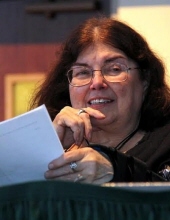

It is with deep sadness that we announce the passing of Dr. Nancy Ellen Rupprecht on Friday, August 7, 2020, in Murfreesboro, Tennessee.
Nancy, the daughter of Nancy Berneeda and Dr. George John Rupprecht, was born in Coeur d’Alene, Idaho. Her family moved when she was very young, and she grew up in St. Louis, Missouri. Anyone who knew Nancy quickly came to know what an ardent supporter she was of her hometown and every major sports team associated with it.
An exceptional student from a very young age, Nancy was particularly drawn to the study of history. Nancy received her B.A. and M.A. in that subject from the University of Missouri (Columbia), and went on to graduate with a PhD from the University of Michigan. It was at the University of Michigan that Nancy studied with Professor Gerhard Weinberg, who over time became a dear friend.
Nancy began her teaching career as a teaching fellow at the University of Michigan while pursuing her PhD. After a couple of short teaching assignments at Washington University in St. Louis, Grinnell College in Iowa and the University of Missouri (St. Louis), Nancy was hired at Middle Tennessee State University in August of 1985. Nancy became a full professor, and continued to teach at MTSU until the day she died.
At MTSU, Nancy was a Professor of History, the Chair of the Holocaust Studies Program, and one of the first directors of Women’s and Gender Studies. Nancy organized and chaired Holocaust Studies conferences for many years, published several articles and books and received awards for her contributions to History and Women’s Studies. Not only academic colleagues and students, but family and friends would concur that Nancy had a special talent for bringing history to life.
Nancy was interested not only in history, but in literature, sports, music, art, film, religion and politics as well. Whether conversing at the dinner table, hosting one of her annual Mozart’s birthday parties, or arguing in e-mails, Nancy managed to enlighten us with facts, anecdotes and witty commentary. We were all her students, and we all wished she had been our professor.
In addition to her parents, Nancy was predeceased by her grandparents; Jacob and Mary Ellen Doty Baird, Raymond George Rupprecht, and Ione Doyle and Edward Aaron (Hy) Neufeld, her aunts, Velma Grace and Anna Belle Baird, and four special friends who died too young: Terry Bunston, Deborah Johnson, Susan Pentlin and Thaddeus Smith.
Nancy leaves behind and will be greatly missed by her dear sister, Diana Rupprecht, her beloved nephew, Garen Rupprecht Kennedy, her cousins, especially Georgana Baird Morris, as well as her mentor, Gerhard Weinberg. A lifetime’s worth of friends, including Kimberly Allen, Andy Attalai and Christine Koskimaki Attalai, Emily Attalai Kaare, Sharon Brown, Cathy Crabtree, Sheila Crifasi, Steven Feltner, Linda Wirtanen Fitzgerald, Elyce Helford, Elaine Lytle, Al Meives, Floyd Pentlin, Jerry Perry and Janet Weinberg will mourn Nancy’s passing.
A virtual memorial is being planned for Dr. Nancy Ellen Rupprecht on her birthday, September 23, 2020. If desired, and in lieu of flowers, please donate to a charity you think Nancy would have supported.
Topic: Nancy Rupprecht Memorial – Session 2
Time: Sep 23, 2020 07:00 PM Central Time (US and Canada)
Join Zoom Meeting
https://us04web.zoom.us/j/76405793061?pwd=L0FkWENnNHlZMTYvUUZuOVhETHFtdz09
Meeting ID: 764 0579 3061
Passcode: NancyRupp2
A link to this obituary and a tribute wall to leave memories of Dr. Rupprecht is available at https://www.smithfamilyfcs.com/obituaries/Nancy-Ellen-Rupprecht?obId=17971391&fbclid=IwAR26R7cRjPi3ZlhYnY8SrnU3OCTR82PIkOcOi5D5S6YxO9Pv7wIppyrt0HY
